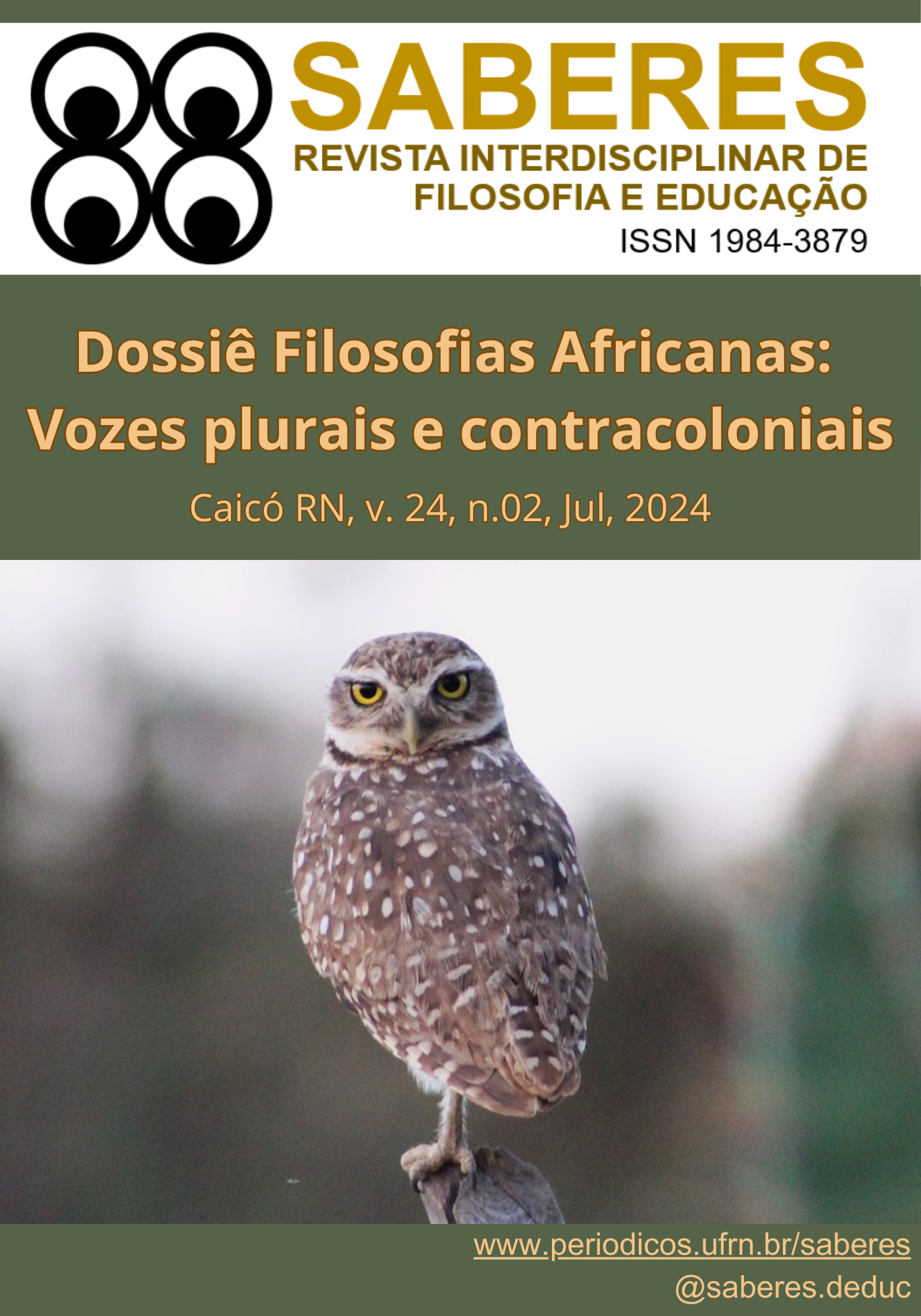Antropologia das Emoções
Uma abordagem a Paul Ekman
DOI:
https://doi.org/10.21680/1984-3879.2024v24n2ID35327Palavras-chave:
Pessoa Humana, Afetividade, EmoçõesResumo
Quando se fala de pessoa humana, deve-se também falar da afetividade, uma das suas componentes, que, apesar de essencialmente não ter a sua origem no intelecto nem na vontade, permite, de igual modo, com que ela se possa autorrealizar de uma melhor forma. Por outro lado, uma boa conceção e educação afetiva, permite, por sua vez, a educação e o desenvolvimento social, como também das gerações vindouras. Neste sentido, uma vez que não apresenta um tratado explicito sobre este tema, com este artigo, pretendo descrever e analisar a conceção das emoções no pensamento de Paul Ekman, um renomado psicólogo norte-americano, que dedicou a sua vida, como investigador, a analisar este afeto na pessoa humana, e como ele é fundamental para garantir a nossa autorrealização. Para atingir este objetivo, inicialmente analisarei o mapa afetivo da pessoa humana, mais concretamente as emoções. Em seguida, analisarei em que é que consiste a educação emocional, segundo Paul Ekman.
Downloads
Referências
AA. VV. A few can catch a liar. Psychological Science, nº 10, 1999.
Autonomic nervous system activity distinguishes between emoticons. Science, vol. 221, nº 4616, 1983.
Emotion and autonomic nervous system activity in the Minangkabau of West Sumatra. Journal of Personality and Social Psychology, vol. 62, nº 6, 1992.
Emotion, physiology, and expression in old age. Psychology and Aging, vol. 6, nº1, 1991.
Experiencing Emotion: A Crosscultural Study. Cambridge: Cambridge University Press, 1986.
Voluntary facial action generates emotion-specific autonomic nervous system activity. Psychophysiology, vol. 27, nº 4, 1990.
AGOSTINHO, De Spiritu et Anima. Disponível em https://www.augustinus.it/. Acesso em 15 de Janeiro de 2024.
ARISTÓTELES, Ética a Nicómaco. Tradução: A. Caeiro. Lisboa: Quetzal Editores, 2020.
Metafisica. trad. C. Gomes. Lisboa: Edições 70, 2021.
BENNETT-GOLEMAN, T. Emotional Alchemy. New York: Harmony, 2001.
BRANDT, M. Judgment of emotion: American and Malay antecedentes. Journal of Cross-Cultural Psychology, nº 12, 1981.
D’AQUINO, T. Summa Theologiae. Disponível em https://www. corpusthomisticum.org/. Acesso em 15 de Janeiro de 2024.
DAMÁSIO, A. Descartes’ Error. Emotion, Reason and the Human Brain. New York: Grosset Putman, 1994.
DARWIN, C., The Expression of the Emotions in Man and Animals. Oxford: Oxford University Press, 2009.
DAVID, S. Emotional Agility. New York: Avery, 2016.
EGER, E. The Gift. New York: Scribner, 2020.
EKMAN, P., Emotions Revealed. New York: Henry Holt and Company, LLC, 2003.
Telling Lies. New York: Norton and Company, 2001.
EKMAN, P.; DAVIDSON, R. The Nature of Emotion. Oxford: Oxford University Press, 1994.
EKMAN, P.; FRIESEN, W. Unmasking the Face. Upper Saddle River: Prentice Hall, 1975.
EKMAN, P.; O’SULLIVAN, M. Who can catch a liar? American Psychologist, nº 46, 1991.
FRIJDA, N. The Emotions. Cambridge: Cambridge University Press, 1986.
GOLEMAN, D. Emotional Intelligence. New York: Bantam Books, 1995.
GOTTMAN, J.; LEVENSON, R., How stable is marital interaction over time? Family Processes, nº 38, 1999.
GREENBERG, M.; SNELL, J. Brain development and emotional development. In: SALOVEY, P. e SLUYTER, D. (Org.). Emotional Development and Emotional Intelligence. New York: Basic Books, 1997.
HEBB, D. The Organization of Behavior. New York: John Wiley & Sons, 1949.
LAZARUS, R. Emotion and Adaptation. Oxford: Oxford University Press, 1991.
LE BRETON, D. Les Passions Ordinaires, Anthropologie des Émotions. Paris: Annand Colin, 1998.
Sourire, Une Anthropologie de l’Énigmatique, Paris: Métallié, 2022.
Lopes, E, La Ceguera para los Valores, Colloquia, nº 9, 2022.
La centralidad del Ser Afectado en el mundo de la vivencias humanas, Poland: KDP Select, 2021.
MALO, A. Antropologia dell’Affettività. Roma: Armando Editore, 1999.
MATÉ, G. The Myth of Normal, New York, Avery, 2022.
NIGRO, G.; NEISSER, U., Point of view in personal memories. Cognitive Psychology, nº 15, 1983.
PATTAKOS, A. Prisoners of Our Thoughts. Viktor Frankl’s Principles for Discovering Meaning in Life and Work. San Francisco: Berrett-Koehler Publishers, 2004.
PETERSON, J. Maps of Meaning. The Architecture of Belief. New York: Routledge, 1999.
PLATÃO, Apologia de Sócrates. Tradução: P. Gomes. Lisboa: Guimarães, 2019.
Protágoras. Tradução: A. Pinheiro. Lisboa: Relógio d’Agua, 1999.
PLUTCHIK, R. The Nature of Emotions, American Scientist, vol. 89, nº4, 2001.
SCHELER, M. Die Idole der Selbsterkenntnis, South Caroline: CreateSpace, 2018.
SHAKESPEARE, W. Othello. New York: Simon & Schuste, 1993.
VON HILDEBRAND, D. Ethik. Regensburg: Josef Habbel, 1973.
Moralia. Regensburg: Josef Habbel, 1980.
ZAJONC, B. Emotion. In AA. VV. (Org.). The Handbook of Social Psychology, vol. 1, Boston: McGraw-Hill, 2001.
Downloads
Publicado
Como Citar
Edição
Seção
Licença
Copyright (c) 2024 Eugénio Lopes

Este trabalho está licenciado sob uma licença Creative Commons Attribution-NonCommercial-ShareAlike 4.0 International License.
Este obra está licenciado com uma Licença Creative Commons Atribuição 4.0 Internacional.
Autores que publicam nesta revista concordam com os seguintes termos:
a. Autores mantém os direitos autorais e concedem à revista o direito de primeira publicação, com o trabalho simultaneamente licenciado sob a Licença Creative Commons Attribution 4.0 que permite o compartilhamento do trabalho com reconhecimento da autoria e publicação inicial nesta revista.
b. Autores têm autorização para assumir contratos adicionais separadamente, para distribuição não-exclusiva da versão do trabalho publicada nesta revista (ex.: publicar em repositório institucional ou como capítulo de livro), com reconhecimento de autoria e publicação inicial nesta revista.
c. Autores têm permissão para publicar e distribuir seu trabalho online (ex.: em repositórios institucionais ou na sua página pessoal) após a publicação inicial nesta revista, já que isso pode gerar alterações produtivas, bem como aumentar o impacto e a citação do trabalho publicado (Veja O Efeito do Acesso Livre).
Foram feitos todos os esforços para identificar e creditar os detentores de direitos sobre as imagens publicadas. Se tem direitos sobre alguma destas imagens e não foi corretamente identificado, por favor, entre em contato com a revista Saberes e publicaremos a correção num dos próximos números.


 English
English Español (España)
Español (España) Português (Brasil)
Português (Brasil)



